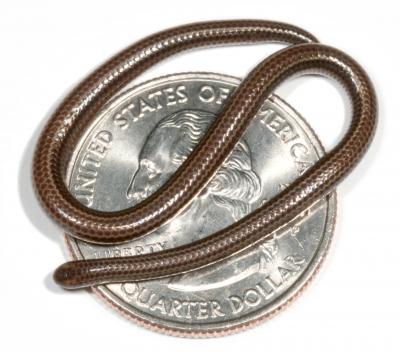Rediscovery of Barbados Threadsnake Highlights Conservation Challenges

In a remarkable turn of events, conservationists have rediscovered the world’s smallest snake, the Barbados threadsnake (Tetracheilostoma carlae), nearly two decades after its last confirmed sighting. This elusive reptile, measuring only 10 centimeters in length and as thin as a strand of spaghetti, was found under a rock during an ecological survey conducted in March 2025. The joint effort involved the Barbados Ministry of the Environment and the conservation organization Re:wild, underscoring the collaborative approach needed for wildlife conservation.
The rediscovery is significant not only due to the snake's rarity but also because it had been feared extinct, having been included on a global list of approximately 4,800 species believed to be lost to science. Connor Blades, a project officer for the environment ministry, expressed concerns about the snake’s future. "If the threadsnake population is not very dense, I am worried about their ability to find mates, particularly if their habitat is under threat and being degraded," he stated (Blades, Connor, Project Officer, Barbados Ministry of the Environment, 2025).
This small snake, first recorded in 1889, has had only a handful of confirmed sightings since then. Its reproductive habits add to the challenges of its survival; unlike many reptiles that can produce fertile eggs without mating, female threadsnakes lay only one egg at a time (Springer, Justin, Caribbean Programme Officer, Re:wild, 2025).
In light of the dramatic habitat loss in Barbados, where 98% of the island's forests have been cleared for agricultural purposes since colonization, the conservation status of the Barbados threadsnake is precarious. Justin Springer remarked, "The threadsnake’s rediscovery is also a call to all of us as Barbadians that forests in Barbados are very special and need protection, not just for the threadsnake, but for other species as well" (Springer, Justin, 2025).
Historical context reveals that the threadsnake's habitat has been severely impacted over the centuries due to agricultural expansion and invasive species. The Ministry of the Environment, in collaboration with Re:wild, has initiated several conservation projects aimed at protecting the island’s endemic species. These projects emphasize the need for comprehensive habitat restoration and public awareness about the importance of local biodiversity (Barbados Ministry of the Environment, 2025).
The rediscovery serves as a critical reminder of the fragility of ecosystems and the urgent need for conservation efforts in the region. Experts believe that increased awareness and community involvement in conservation can significantly impact the future of not only the Barbados threadsnake but also other endangered species in the Caribbean. With ongoing threats from habitat destruction and climate change, the future of the Barbados threadsnake remains uncertain, but its rediscovery brings hope for further research and protective measures.
In summary, the rediscovery of the Barbados threadsnake underscores the importance of continued ecological research and conservation efforts. As habitat loss continues to threaten numerous species, the case of the threadsnake serves as both a cautionary tale and a beacon of hope for biodiversity preservation in Barbados and beyond.
Advertisement
Tags
Advertisement




